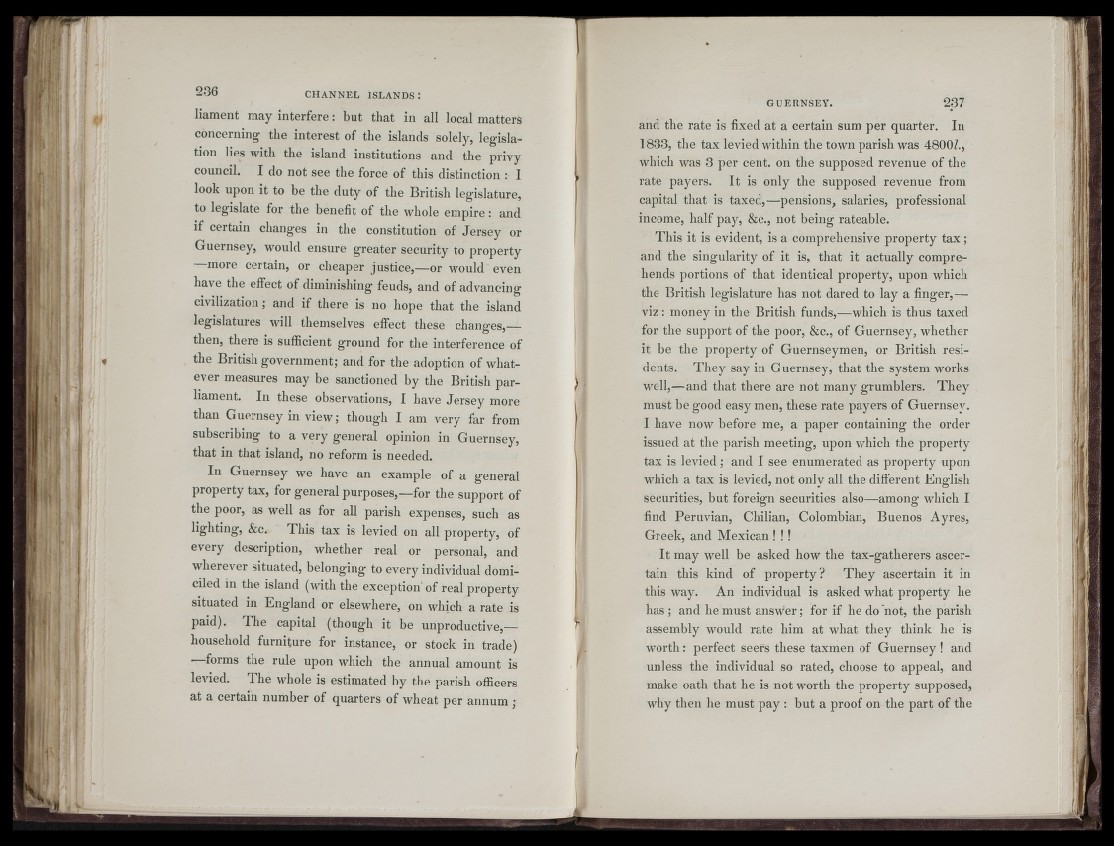
liament may interfere: but that in all local matters
concerning the interest of the islands solely, legislation
lies with the island institutions and the privy
council. I do not see the force of this distinction : I
look upon it to be the duty of the British legislature,
to legislate for the benefit of the whole empire: and
if certain changes in the constitution of Jersey or
Guernsey, would ensure greater security to property
more certain, or cheaper justice,—or would even
have the effect of diminishing feuds, and of advancing
civilization; and if there is no hope that the island
legislatures will themselves effect these changes,__
then, there is sufficient ground for the interference of
the British government; and for the adoption of whatever
measures may be sanctioned by the British parliament.
In these observations, I have Jersey more
than Guernsey in view; though I am very far from
subscribing to a very general opinion in Guernsey,
that in that island, no reform is needed.
In Guernsey we have an example of a general
property tax, for general purposes,—for the support of
the poor, as well as for all parish expenses, such as
lighting, &c. This tax is levied on all property, of
every description, whether real or personal, and
wherever situated, belonging to every individual domiciled
in the island (with the exception of real property
situated in England or elsewhere, on which a rate is
paid). The capital (though it be unproductive,—
household furniture for instance, or stock in trade)
—forms the rule upon which the annual amount is
levied. The whole is estimated by the parish officers
at a certain number of quarters of wheat per annum ;
I -
and the rate is fixed at a certain sum per quarter. In
1833, the tax levied within the town parish was 4800/.,
which was 3 per cent, on the supposed revenue of the
rate payers. It is only the supposed revenue from
capital that is taxed,—pensions, salaries, professional
income, half pay, &c., not being rateable.
This it is evident, is a comprehensive property tax ;
and the singularity of it is, that it actually comprehends
portions of that identical property, upon which
the British legislature has not dared to lay a finger,—
viz: money in the British funds,—which is thus taxed
for the support of the poor, &c., of Guernsey, whether
it be the property of Guernseymen, or British residents.
They say in Guernsey, that the system works
well,—and that there are not many grumblers. They
must be good easy men, these rate payers of Guernsey.
I have now before me, a paper containing the order
issued at the parish meeting, upon which the property
tax is levied; and I see enumerated as property upon
which a tax is levied, not only all the different English
securities, but foreign securities also—among which I
find Peruvian, Chilian, Colombian, Buenos Ayres,
Greek, and Mexican ! ! !
It may well be asked how the tax-gatherers ascertain
this kind of property? They ascertain it in
this way. An individual is asked what property he
has ; and he must answer; for if he do not, the parish
assembly would rate him at what they think he is
worth: perfect seers these taxmen of Guernsey ! and
unless the individual so rated, choose to appeal, and
make oath that he is not worth the property supposed,
why then he must pay : but a proof on the part of the
■JIV 'I
k